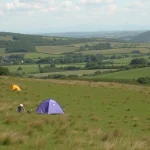Defining Unique Camping Experiences in the UK
Discovering unique camping experiences in the UK means exploring beyond traditional tents. Today, travelers can choose from a variety of innovative options that enhance outdoor stays with comfort and creativity. Among the most popular types of UK camping are glamping pods, treehouses, eco-camping sites, and safari tents. Each offers its own special charm.
Glamping combines glamour with camping by providing cozy, well-equipped pods and tents that often feature heating, electricity, and comfy beds. Treehouses offer an elevated connection to nature, allowing campers to sleep suspended among branches. Eco-camping focuses on sustainable practices, using renewable energy and minimizing environmental impact, making it ideal for eco-conscious adventurers.
Also to read : What Are the Best Sites for Camping in the UK?
These unique formats spread widely across the UK, from remote countryside retreats to woodland hideaways and coastal spots. Unlike traditional camping, which requires pitching a tent and basic amenities, these options bring novel comfort and convenience, widening the appeal of outdoor holidays. Whether you’re seeking rustic simplicity or refined charm, UK camping now accommodates diverse tastes, making unique camping experiences both accessible and memorable.
Appeal and Changing Preferences of Modern Campers
Exploring evolving tastes in the UK camper community
Also to read : What Unique Challenges Do Campers Face in the UK’s Countryside?
Modern campers in the UK now seek more than just a basic outdoor experience. The appeal of unique stays has grown, reflecting a shift towards comfort, luxury, and novelty. This change aligns with broader camping trends in the UK, where travelers prioritize well-appointed accommodations that blend adventure with ease.
Social media plays a vital role in accelerating this trend. Visually striking setups shared on platforms inspire campers to explore distinctive locations, making experiential travel a key driver. This influence amplifies interest in unusual and personalized stays that offer memorable stories beyond traditional tents.
Motivations among UK campers vary but often include sustainable travel choices, which resonate deeply amid growing environmental awareness. Many families seek kid-friendly options that balance fun and safety outdoors, while couples lean towards romantic retreats emphasizing privacy and picturesque settings. The demand for these specialized experiences underscores an evolution in UK camper preferences, where the focus is on meaningful connection with nature, combined with comfort and style.
Understanding these desires helps providers tailor offerings that meet modern expectations, ensuring the sector thrives as consumer tastes continue to evolve towards unique and enhanced outdoor adventures.
Economic and Tourism Benefits for the UK
Camping has become a powerful driver of UK tourism impact, significantly boosting rural economic benefits. By attracting visitors to less urbanized areas, camping fuels the growth of local businesses, such as shops, cafes, and outdoor equipment suppliers. This direct economic contribution often extends indirectly by increasing demand for regional produce and services, creating a chain effect within rural communities.
One key advantage of camping is its role in season extension and year-round tourism. Unlike traditional holiday spots that thrive only in peak months, camping appeals across seasons—spring, autumn, and even mild winter periods—helping stabilize income for rural businesses. This extended visitor presence ensures more consistent employment and investment opportunities beyond the typical summer rush.
Several success stories illustrate how camping revitalizes regions. For example, small villages near national parks have seen significant uplift from niche camping sites offering eco-friendly or glamping experiences. These unique offerings attract diverse demographics, boosting the camping economy while promoting sustainable tourism. In turn, this fosters stronger community ties and economic resilience, highlighting camping’s vital role in supporting the UK’s rural landscapes.
Enhancing the UK’s Tourism Image and Market Differentiation
The UK tourism image benefits greatly from its reputation for diverse and imaginative holiday experiences. Travelers today seek more than traditional sightseeing—they crave uniqueness and authenticity. By promoting unique holiday experiences such as distinctive camping options, the UK effectively sets itself apart from other destinations. This approach not only refreshes the country’s tourism appeal but also creates a dynamic destination differentiation.
Unique camping, including glamping and eco-friendly stays, offers something rare in the global market. These alternatives appeal to international visitors and niche audiences who prefer immersive, nature-based adventures over standard hotel accommodations. By highlighting these experiences, the UK can attract more discerning travelers eager for authentic engagement with local culture and environment.
This strategy enhances the UK tourism image by showcasing both its rich heritage and contemporary spirit. It positions the UK not just as a place to visit but as a destination where travelers can craft personal stories. Emphasizing destination differentiation through unique experiences strengthens the UK’s appeal in a competitive tourism market, fostering growth and sustainability in visitor numbers.
Challenges and Future Opportunities for Unique Camping
Unique camping in the UK faces several challenges rooted in infrastructure limitations and regulatory complexities. Many campsites must upgrade facilities to balance comfort with environmental preservation, a key aspect of promoting sustainable tourism. Regulatory hurdles often slow progress, particularly when introducing innovative concepts that require planning permission or environmental assessments. These constraints make it difficult to expand or improve sites rapidly.
Despite this, the industry shows promising opportunities for innovation. Accessibility is a growing focus, with more efforts to design campsites that welcome campers with diverse needs. Additionally, themed experiences—such as wellness retreats or eco-focused stays—are emerging, addressing evolving consumer desires for unique and meaningful adventures.
Future trends anticipate growth in eco-friendly accommodations, driven by consumer demand for responsible travel options. With rising interest in off-the-grid and immersive nature experiences, camping providers have a chance to lead in creating low-impact, high-quality stays. Emphasizing sustainable tourism alongside creative, accessible options could reshape the UK camping landscape, enhancing appeal while protecting natural resources.





